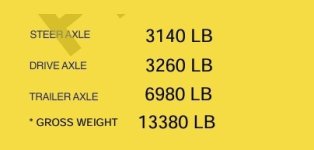ransch
Member
I will be going on my first trip with our 2025 252RL this weekend and I see that there are wind gusts up to 55mph forecasted. I am wondering how does everyone deals with high winds?
I will be on the interstate for most of the traveling. I doubt I will be over 65mph. I will also be carrying a full tank of fresh water, 45gallon. I believe this would lower the center of gravity which should help. I often take water with me on trips since some campgrounds can have water which is high in nitrates. Like Perrot State park.
Randy
I will be on the interstate for most of the traveling. I doubt I will be over 65mph. I will also be carrying a full tank of fresh water, 45gallon. I believe this would lower the center of gravity which should help. I often take water with me on trips since some campgrounds can have water which is high in nitrates. Like Perrot State park.
Randy


